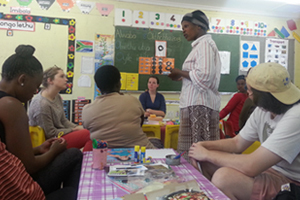Health and education join hands to help local school
17 January 2014 | Story by Newsroom
In a first for UCT, health sciences and education are collaborating to make a difference at schools in Khayelitsha - a community on the university's doorstep.
What started out as once-off screening of Intshayelelo Primary Grade R learners by occupational therapy (OT) students studying child learning development, has become a permanent fixture in the final year OT curriculum.
The screening, which forms part of SHAWCO's outreach programme, has also led to the establishment of a new governing body sub-committee which aims to foster greater parent involvement. The school is one of the six in the area working with UCT's School Improvement Initiative (SII) to improve the quality of education received by township children.
"Although the collaboration for now involves only OT and education, we are looking at ways to extend it to include other departments within health sciences. We are keen to look at how health can contribute to what is happening in local schools," comments Associate Professor Roshan Galvaan from UCT's OT division.
The new foundation phase sub-committee came about during a feedback session after the screening where the Grade R learners' parents expressed the need for more involvement in their children's education. The sub-committee, which consists of parents and teachers, aims to promote parent involvement through regular workshops and its establishment has been hailed as a turning point in teacher-parent relations at Intshayelelo Primary. "Teachers thought the parents were disinterested, but it turns out that the parents didn't know how to get involved or where they could assist," said Dr Patti Silbert, Project Manager of the Schools Improvement Initiative.
The inclusion of the Grade R screening in the OT curriculum will see fourth year students annually spend three days screening learners. "Ultimately we would like to establish an interdisciplinary community of practice, which will also include students from communication sciences and disorders and the PGCE students from the School of Education, undertaking their teaching practice," explained Galvaan.
OT students are not the only link that UCT has with the community. There is an ongoing programme in which UCT student teachers work at Khayelitsha schools to gain practical experience.
"One of objectives of the SII is to reactivate involvement of student teachers in Khayelitsha schools," clarified Silbert. "Student teachers learn a huge amount by working in under-resourced schools, while the schools benefit by having new teaching methodologies introduced by the students. This is a great example of partnership in action."
Story by Abigail Calata. Image supplied.
 This work is licensed under a Creative Commons Attribution-NoDerivatives 4.0 International License.
This work is licensed under a Creative Commons Attribution-NoDerivatives 4.0 International License.
Please view the republishing articles page for more information.










